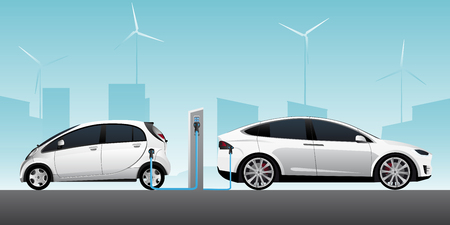1. Introduction: Setting the Scene for Sustainable Driving
The automotive industry stands at a crossroads, confronted by escalating environmental challenges and increasing regulatory pressures to reduce carbon emissions. With transport accounting for nearly 27% of the UK’s greenhouse gas emissions, the need for greener mobility solutions has never been more urgent. The UK, with its robust engineering heritage, innovative research hubs, and progressive government policies, is uniquely positioned to become a leader in eco-friendly car manufacturing. The country’s commitment to phasing out new petrol and diesel cars by 2035 underscores this ambition, placing a premium on electric vehicles (EVs), hydrogen technologies, and sustainable production methods. As British consumers grow more environmentally conscious and urban centres implement stricter emission zones, both local manufacturers and global carmakers are accelerating efforts to develop cleaner, smarter vehicles. This green revolution on wheels is not merely about compliance; it represents an opportunity for the UK to reinvent its automotive sector, bolster economic resilience, and drive towards a low-carbon future.
2. The Role of British Innovation in Green Vehicle Design
British engineering has long been synonymous with cutting-edge automotive design, and the nation’s transition to eco-friendly motoring is proving no exception. The UK’s unique combination of world-class universities, R&D-driven manufacturers, and a thriving start-up ecosystem is driving forward the low-emission vehicle sector. From Coventry to Sunderland, homegrown brands are reimagining how vehicles are built, focusing on sustainability from concept to showroom. British innovators are not just retrofitting existing technologies but are fundamentally reshaping the architecture of electric and hybrid vehicles to meet stringent emissions targets and consumer expectations.
Engineering Expertise: A Catalyst for Change
The UK boasts a rich tradition of automotive engineering excellence, which now underpins its progress in green vehicle development. Key research centres such as the Advanced Propulsion Centre and the Warwick Manufacturing Group are collaborating with established brands like Jaguar Land Rover and niche disruptors such as Arrival. These partnerships have resulted in pioneering advancements, including lightweight composite materials, advanced battery systems, and powertrain efficiency improvements that set benchmarks across Europe.
Key Contributions by British Brands
| Brand | Innovation | Impact |
|---|---|---|
| Jaguar Land Rover | Modular electric platforms & next-gen battery tech | Enhanced range and recyclability in premium EVs |
| Nissan Sunderland Plant | Mass production of affordable EVs (e.g., Nissan Leaf) | Mainstream adoption of zero-emission vehicles |
| Arrival | Microfactory model & recyclable body panels | Reduced carbon footprint in urban logistics vehicles |
| Lotus Cars | Lightweight structures for performance EVs | Maximised efficiency without sacrificing driving dynamics |
A Culture of Collaboration and Sustainability
The distinctively British approach favours collaboration between academia, industry, and government agencies. This synergy fosters not only technical breakthroughs but also a holistic sustainability ethos—embracing the entire vehicle lifecycle from raw materials sourcing to end-of-life recycling. With incentives such as the UK Automotive Transformation Fund and an evolving regulatory landscape aimed at phasing out internal combustion engines, British firms are well placed to lead Europe’s green revolution on wheels.

3. Sourcing and Sustainability: Materials and Supply Chains
The UK automotive industry is in the midst of a transformative shift, with manufacturers prioritising sustainability across the entire supply chain. As eco-consciousness takes centre stage, British carmakers are moving beyond emissions reduction to address the full lifecycle impact of their vehicles. This means scrutinising not only what goes under the bonnet, but also where and how every component is sourced.
Sustainable Materials: From Recycled Plastics to Bio-Based Alternatives
British manufacturers are increasingly turning to recycled and renewable materials. For instance, several models now incorporate upholstery made from recycled ocean plastics, while bioplastics derived from plant sources are being developed for interior trim and dashboard components. The use of aluminium and high-strength steel with high recycled content is also on the rise, reducing both environmental footprint and dependency on virgin resources.
| Material | Traditional Source | Sustainable Alternative | UK Implementation Example |
|---|---|---|---|
| Plastics | Petroleum-based polymers | Recycled ocean plastics, bioplastics | Jaguar Land Rover’s “Econyl” interiors |
| Leather | Bovine hides (often imported) | Plant-based vegan leather, recycled fibres | Bentley’s vegan interior options |
| Metals | Virgin aluminium/steel ore | Recycled aluminium/steel alloys | Nissan Sunderland plant’s closed-loop recycling system |
Ethical Sourcing: Ensuring Transparency and Fair Practices
Transparency within supply chains has become non-negotiable for UK automakers committed to responsible manufacturing. Companies now demand traceability for critical raw materials such as lithium, cobalt, and rare earth elements used in EV batteries. By working with certified suppliers and embracing blockchain technology, British brands aim to guarantee that these materials are extracted without human rights abuses or environmental damage—a crucial factor in aligning with UK Modern Slavery Act requirements.
Responsible Supply Chain Practices: Localisation and Carbon Footprint Reduction
The push towards localisation is another defining trend. By sourcing more components locally or from within Europe, manufacturers can dramatically reduce logistics-related emissions and enhance supply chain resilience post-Brexit. This approach not only supports the domestic economy but also helps brands meet the stringent carbon targets set by the UK government.
Key Takeaway: A Blueprint for a Greener Future
The UK automotive sectors focus on sustainable sourcing isn’t just about ticking regulatory boxes—it’s about reshaping industry norms for a low-carbon future. Through collaborative initiatives, innovative material choices, and ethical partnerships, Britain’s carmakers are setting new benchmarks in responsible manufacturing on a global stage.
4. Manufacturing Processes: Clean Production in British Factories
The UK’s automotive sector has become a prime example of how traditional manufacturing can be reimagined through the lens of environmental stewardship. As carmakers respond to stringent emissions targets and increasing public demand for sustainable products, factories across Britain are embracing energy-efficient production techniques and zero-waste policies with renewed vigour. This transformation is not just a nod to green credentials but a fundamental shift towards operational efficiency and future-proofing the industry.
Energy-Efficient Production Techniques
British car manufacturers are investing heavily in advanced technologies designed to minimise energy consumption at every stage of the assembly process. Smart automation, precision robotics, and real-time data analytics are now commonplace on factory floors, enabling seamless integration of renewable energy sources such as solar panels and wind turbines. Many plants have transitioned to LED lighting, optimised HVAC systems, and heat recovery solutions that reduce overall electricity usage and carbon footprint.
Comparison of Traditional vs. Eco-Friendly Manufacturing Approaches
| Aspect | Traditional Approach | Eco-Friendly Approach |
|---|---|---|
| Energy Source | Grid Electricity (fossil fuels) | Renewable Energy (solar, wind) |
| Lighting & Climate Control | Standard Lighting & HVAC | LEDs & Optimised HVAC with Heat Recovery |
| Waste Management | Landfill Disposal | Zero-Waste Initiatives (reuse & recycling) |
| Production Efficiency | Manual/Legacy Automation | Smart Automation & Data Analytics |
| Water Usage | Conventional Systems | Closed-Loop Water Recycling |
The Push for Zero-Waste Policies
Pioneering British factories are moving beyond compliance by actively designing out waste from their processes. This includes everything from sourcing recycled materials for vehicle components to implementing closed-loop water systems that dramatically reduce freshwater consumption. By adopting circular economy principles, manufacturers ensure that materials such as metals, plastics, and solvents are recovered and reused wherever possible. Notably, some leading brands have achieved landfill-free status, sending zero production waste to landfill—a feat that sets a new benchmark for the industry.
A Look Ahead: Sustainable Manufacturing as Standard Practice
The drive for clean production is shaping a new norm in British automotive manufacturing, where sustainability is not an afterthought but an integral part of operational strategy. As more carmakers demonstrate measurable progress in reducing their environmental impact, these innovations are expected to ripple across the sector—solidifying the UK’s reputation as a leader in the green revolution on wheels.
5. Government Strategies and Industry Collaboration
The UK government has played a pivotal role in catalysing the green revolution within the automotive sector. Through a combination of policy incentives, funding schemes, and regulatory frameworks, the state has fostered an environment conducive to eco-friendly car manufacturing. Notably, initiatives such as the Road to Zero Strategy and grants like the Plug-in Car Grant have incentivised manufacturers to innovate towards lower emissions and greater efficiency.
Key Government Initiatives
| Initiative | Description | Impact on Industry |
|---|---|---|
| Road to Zero Strategy | A comprehensive plan aiming for at least 50% of new car sales to be ultra-low emission by 2030 | Accelerated investment in electric vehicle (EV) infrastructure and R&D |
| Plug-in Car Grant | Financial support for consumers purchasing low-emission vehicles | Boosted demand for EVs, prompting manufacturers to expand green fleets |
| Advanced Propulsion Centre UK | A £1 billion partnership supporting the development of low-carbon propulsion technologies | Enhanced collaboration between OEMs, suppliers, and academia |
Cross-Sector Partnerships Driving Innovation
The strength of the UKs eco-friendly automotive manufacturing also lies in its robust cross-sector partnerships. Collaborations between automakers, technology firms, academic institutions, and government bodies have proven instrumental in advancing sustainable solutions. For example, consortia involving major brands like Jaguar Land Rover, Nissan, and innovative SMEs have delivered breakthroughs in battery technology, lightweight materials, and circular manufacturing processes.
Benefits of Collaboration
- Shared expertise accelerates technological advancements.
- Pooled resources reduce individual risk and increase project scale.
- Diverse perspectives foster holistic approaches to sustainability challenges.
Performance Metrics: Measuring Success
| Collaboration Type | Outcome Indicator |
|---|---|
| Industry-Government Consortia | % Reduction in fleet-wide CO2 emissions |
| Academic-Industry Partnerships | No. of patents filed for eco-technologies annually |
The combined effect of proactive government strategies and dynamic industry collaboration has significantly accelerated the UKs journey towards greener automotive manufacturing. This synergy not only positions Britain as a leader in sustainable mobility but also sets a benchmark for other nations aspiring to achieve net zero in transport.
6. Challenges Ahead: Market, Infrastructure, and Consumer Adoption
The journey towards a fully sustainable automotive sector in the UK is paved with significant challenges, despite the promising momentum of green car manufacturing. One of the foremost obstacles lies in the development and scalability of supporting infrastructure. While major cities such as London and Manchester have seen an increase in charging points for electric vehicles (EVs), rural areas remain underserved, creating a disparity that can deter potential buyers outside urban centres.
Infrastructure Gaps: Urban vs Rural
| Urban Areas | Rural Areas | |
|---|---|---|
| Public Charging Points | High density | Low density |
| Fast Charging Access | Widely available | Sparse |
| Government Investment | Substantial | Limited |
The market landscape also presents hurdles. While government incentives—such as grants for EV purchases and exemptions from congestion charges—have spurred initial uptake, these are not permanent fixtures. As incentives phase out, the higher upfront cost of eco-friendly cars compared to traditional petrol and diesel models may slow adoption rates, particularly among price-sensitive consumers.
Consumer Attitudes and Behavioural Barriers
Despite growing environmental awareness, many UK drivers remain hesitant about switching to greener vehicles. Concerns over range anxiety, battery lifespan, and resale values persist. Moreover, there is a cultural attachment to established brands and combustion engine performance that green alternatives must work hard to overcome.
Key Consumer Concerns Hindering Adoption:
- Range limitations and charging times
- Lack of second-hand market options
- Uncertainty over long-term maintenance costs
Market Realities for Manufacturers
From a manufacturing standpoint, scaling up production while maintaining eco-credentials adds another layer of complexity. Sourcing sustainable materials at scale, meeting stringent UK and EU regulatory standards, and ensuring supply chain transparency are all pressing issues that require ongoing innovation and investment.
Tackling these multifaceted challenges will be crucial if the UK’s green revolution on wheels is to move from niche adoption to mainstream dominance—necessitating collaboration between government bodies, manufacturers, infrastructure providers, and consumers alike.
7. Conclusion: Road Ahead for Green Cars in Britain
As the UK firmly positions itself at the forefront of sustainable automotive manufacturing, the road ahead for green cars is paved with both significant opportunities and ongoing challenges. The nation’s ambitious net-zero targets, coupled with increasing consumer demand for eco-friendly vehicles, have set the stage for a transformative era in British car manufacturing. However, the journey towards a fully sustainable automotive sector requires continued innovation, collaboration, and investment.
Opportunities Shaping the Future
The future trajectory of environmentally responsible car manufacturing in Britain is shaped by several key opportunities:
| Opportunity | Description |
|---|---|
| Advanced Battery Technology | Continued R&D into solid-state batteries and alternative chemistries promises longer ranges, faster charging, and lower environmental impact. |
| Circular Economy Initiatives | Emphasis on recycling, remanufacturing, and material recovery will reduce waste and resource consumption throughout vehicle lifecycles. |
| Government Policy & Incentives | UK government support through grants, tax incentives, and infrastructure investment will accelerate market uptake and industrial transition. |
| Export Potential | British expertise in green automotive technologies creates export opportunities to global markets seeking low-emission solutions. |
Challenges on the Horizon
While prospects are bright, certain hurdles remain:
- Sustained investment in charging infrastructure and renewable energy supply is vital to underpin mass adoption.
- The skills gap must be bridged through targeted education and training programmes to equip the workforce for new technologies.
- Global supply chain resilience must be enhanced to mitigate risks related to critical raw materials.
A Vision for 2030 and Beyond
Looking forward, Britain’s green revolution on wheels is likely to accelerate as manufacturers deepen their commitment to sustainability. Collaboration between industry leaders, policymakers, academia, and local communities will ensure that environmental responsibility becomes integral to every aspect of car design and production. By fostering an ecosystem that values innovation, transparency, and circularity, the UK has an unparalleled opportunity not only to meet its climate goals but also to lead the global drive towards cleaner mobility solutions.
In summary, while the transition presents complex challenges, it also offers immense potential for growth, job creation, and global leadership. The UK’s determination and ingenuity will be critical as it steers towards a greener automotive future—one where every journey makes a difference.


